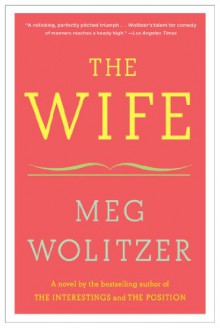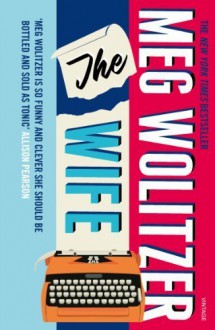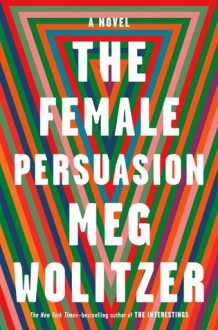
This book is amazing. Wolitzer perfectly captures the voice of a wife who has gone bitter and is full of some regrets on how she lived her life. The main character, Joan Castleman is flying to Finland with her husband, Joseph "Joe" Castleman. Joe has won the Helsinki for her works in literature. Joan starts to think back to when she first met Joe and also provides insight into how he is based on the women who raised him. The back and forth to the past and present really works and you start to get a glimmer of why Joan may be resentful of her husband. This book opens up a lot of questions I think. One, what does it mean to be successful? Two, what does it mean to be a wife and a mother? Three, would you give up one thing, just so that you could have the love of someone? Four, do all marriages have secrets that still leak to those around them? This was very short (just over 200 pages) so the reading went fast.
"The Wife" follows 60 year old Joan Castleman who reluctantly is traveling with her husband Joe as he goes to Finland to accept his Helsinki award. I have to confess at this point I didn't even know this was a real award, and then went and looked it up. It seems the award is mired in controversy, so good on Wolitzer for using this framework in her story. Joan we find is ready to leave Joe. She plans on asking him for a divorce when they return home since she realizes she is not happy in their marriage and has not been for a while. As Joan flashbacks to when she first met Joe, their marriage, and their children.
I found Joan's voice full of acid. The character has a turn of phrase. She is also very observant you find to what is going on around her. You may initially not like her, especially when you find out how she and Joe got involved, but I moved to pity really quickly when it becomes apparent that she's in over her head with Joe and that perhaps the only reason they stay together is something else more than just being in love and their three kids.
Via Joan we get insight into Joe (he's a cheater, self-involved, jealous of other's success) and their three children. Though we talk of Joan and Joe's two daughters, the one child we focus on is their son David. We don't know what happened initially, but we do know that Joe and David are estranged and that David at one point attacked his father. And slowly but surely Joan leads the readers back to the secrets of her marriage, and things she was pretty much hiding from herself so she didn't dwell on it too much.
I loved the writing in this book. As I said, Joan's words are full of acid. This is a woman who has seen not all, but enough, and who is realizing that she should have been brave enough to choose another path.
"And even the brunette flight attendant, who had earlier seemed such a seduction to Joe, now looked like a tired hooker who wants to call it quits. She had no more cookies to offer; her basket was empty."
"There was his first novel, The Walnut, that slender book from a much more innocent time, about a married professor and his best student who fall in love, leading to an event that causes the professor to hurriedly abandon his wife and child, flee to New York City with the student, and eventually marry her. This book is pure autobiography—the story of the two of us and Joe’s first wife, Carol."
"But wives, oh wives, when they weren’t being bitter or melancholy or counting the beads on their abacus of disappointment, they could take care of you with delicate and effortless ease."
“The men!” she said. “No offense, but how can you stand them, Joan? They just talk and talk and never shut themselves up."
The flow of the book was good. At first you may wonder why at times Joan goes over the same events, but you realize why after a while. You get the first impression of the event and then what was actually going on then. Joan realizes that all she is seen as by the outside world is Joe's wife. She's there to steer him and keep him safe and sound. She realizes that she wants a wife or should have one that could have done the same for her.
The setting of the book takes place in the early 2000s and jumps back and forth to the 1950s and up through the decades of Joe and Joan's marriage.
The ending though leaves Joan with a chance to reveal a greater truth, but she chooses not to do so, because in the end, she decides to do what wives do, take care of their husbands.

 Log in with Facebook
Log in with Facebook 







